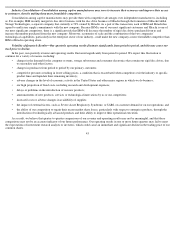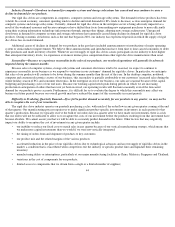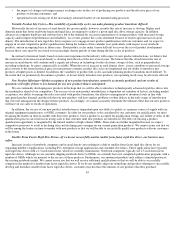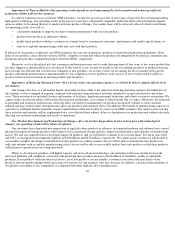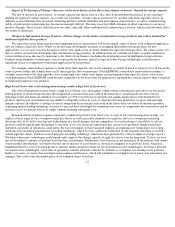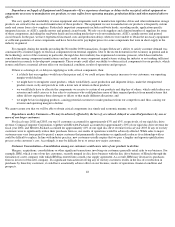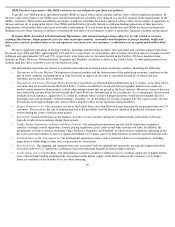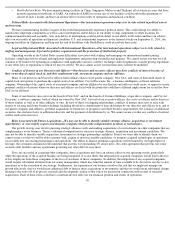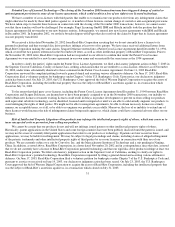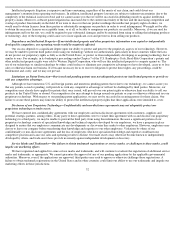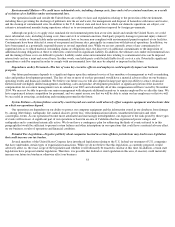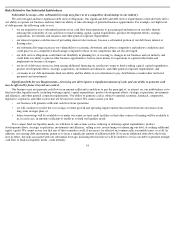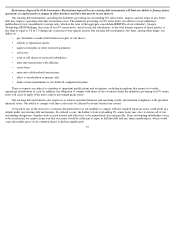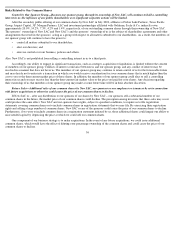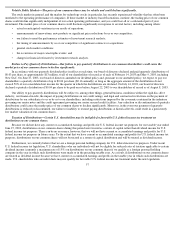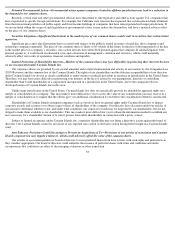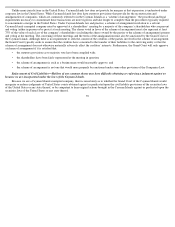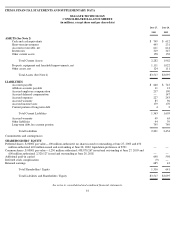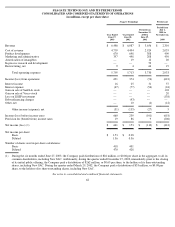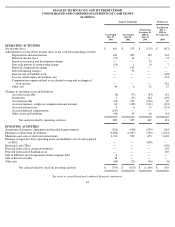Seagate 2002 Annual Report Download - page 58
Download and view the complete annual report
Please find page 58 of the 2002 Seagate annual report below. You can navigate through the pages in the report by either clicking on the pages listed below, or by using the keyword search tool below to find specific information within the annual report.
Environmental Matters—We could incur substantial costs, including cleanup costs, fines and civil or criminal sanctions, as a result
of violations of or liabilities under environmental laws.
Our operations inside and outside the United States are subject to laws and regulations relating to the protection of the environment,
including those governing the discharge of pollutants into the air and water, the management and disposal of hazardous substances and wastes,
and the cleanup of contaminated sites. In addition to the U.S. federal, state and local laws to which our domestic operations are subject, our
extensive international manufacturing operations subject us to environmental regulations imposed by foreign governments.
Although our policy is to apply strict standards for environmental protection at our sites inside and outside the United States, we could
incur substantial costs, including cleanup costs, fines and civil or criminal sanctions, third-party property damage or personal injury claims if
we were to violate or become liable under environmental laws or become non-compliant with environmental permits required at our facilities.
Contaminants have been detected at some of our present and former sites, principally in connection with historical operations. In addition, we
have been named as a potentially responsible party at several superfund sites. While we are not currently aware of any contaminated or
superfund sites as to which material outstanding claims or obligations exist, the discovery of additional contaminants or the imposition of
additional cleanup obligations at these or other sites could result in significant liability. In addition, the ultimate costs under environmental laws
and the timing of these costs are difficult to predict. Liability under some environmental laws relating to contaminated sites can be imposed
retroactively and on a joint and several basis. In other words, one liable party could be held liable for all costs at a site. Potentially significant
expenditures could be required in order to comply with environmental laws that may be adopted or imposed in the future.
Dependence on Key Personnel—The loss of some key executive officers and employees could negatively impact our business
prospects.
Our future performance depends to a significant degree upon the continued service of key members of management as well as marketing,
sales and product development personnel. The loss of one or more of our key personnel would have a material adverse effect on our business,
operating results and financial condition. We believe our future success will also depend in large part upon our ability to attract, retain and
further incentivize highly skilled management, marketing, sales and product development personnel. A significant portion of the incentive
compensation for our senior management vests in calendar year 2003 and substantially all of this compensation will have vested by November
2004. We may not be able to provide our senior management with adequate additional incentives to remain employed by us after this time. We
have experienced intense competition for personnel, and we cannot assure you that we will be able to retain our key employees or that we will
be successful in attracting, assimilating and retaining personnel in the future.
System Failures—
System failures caused by events beyond our control could adversely affect computer equipment and electronic data
on which our operations depend.
Our operations are dependent on our ability to protect our computer equipment and the information stored in our databases from damage
by, among other things, earthquake, fire, natural disaster, power loss, telecommunications failures, unauthorized intrusion and other
catastrophic events. As our operations become more automated and increasingly interdependent, our exposure to the risks posed by these types
of events will increase. A significant part of our operations is based in an area of California that has experienced power outages and
earthquakes and is considered seismically active. We do not have a contingency plan for addressing the kinds of events referred to in this
paragraph that would be sufficient to prevent system failures and other interruptions in our operations that could have a material adverse effect
on our business, results of operations and financial condition.
Potential Tax Legislation—Negative publicity about companies located in certain offshore jurisdictions may lead to new legislation
that could increase our tax burden.
Several members of the United States Congress have introduced legislation relating to the U.S. federal tax treatment of U.S. companies
that have undertaken certain types of expatriation transactions. While we do not believe that this legislation, as currently proposed, would
adversely affect us, the exact scope of the legislation and whether it will ultimately be enacted is unclear at this time. In addition, certain state
legislatures have proposed similar legislation. Therefore, it is possible that federal or state legislation in this area, if enacted, could materially
increase our future tax burden or otherwise affect our business.
53


